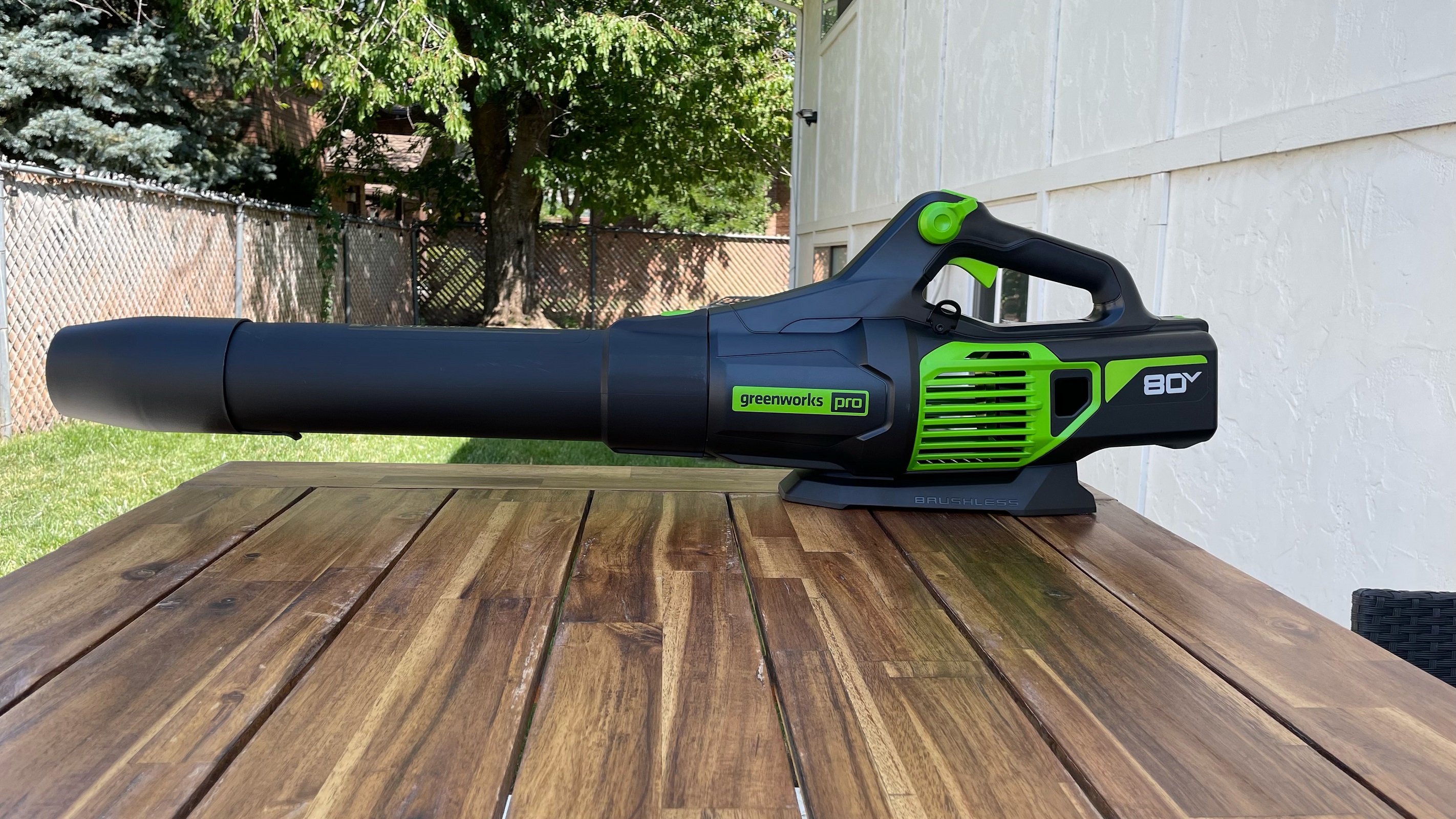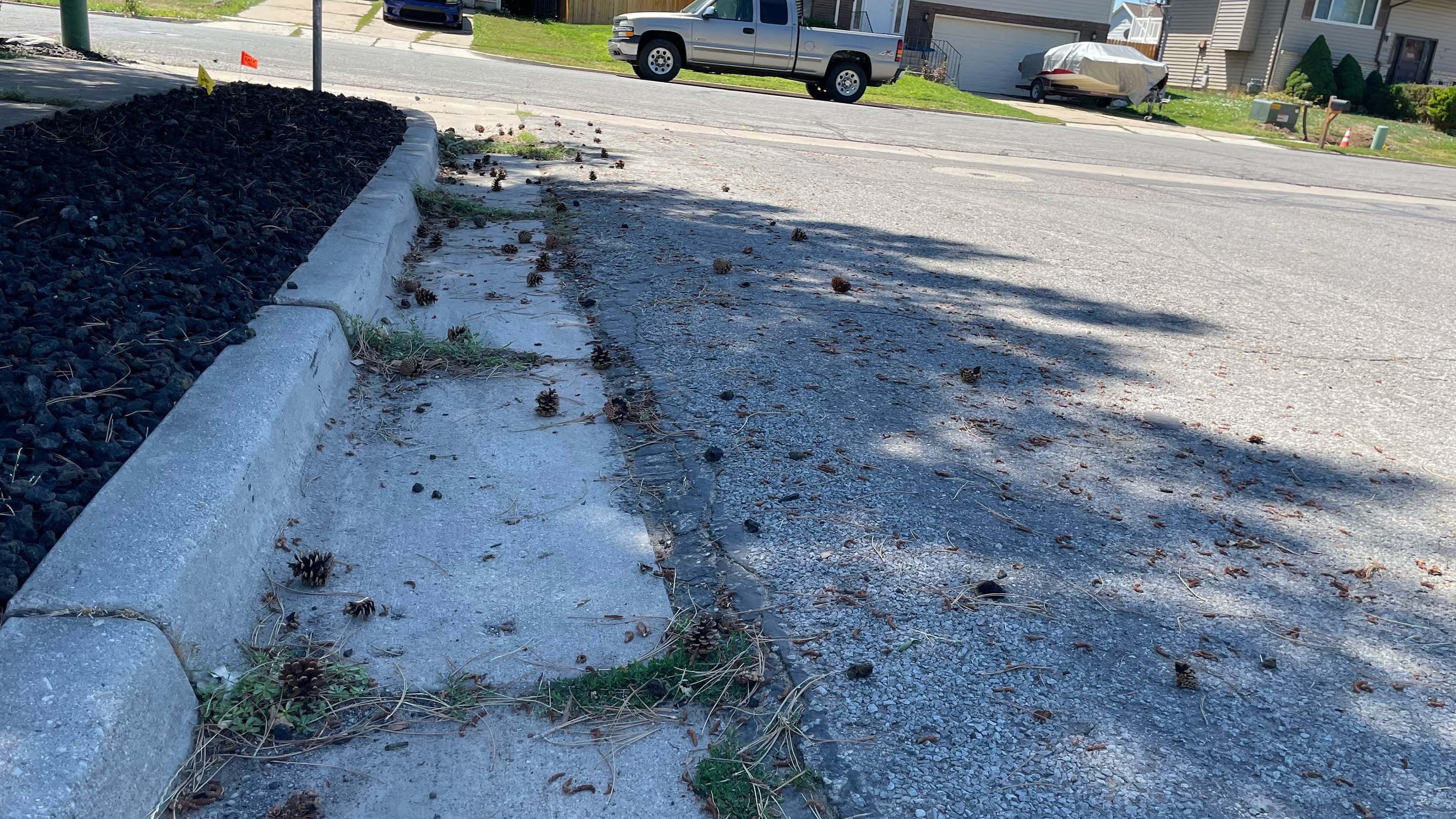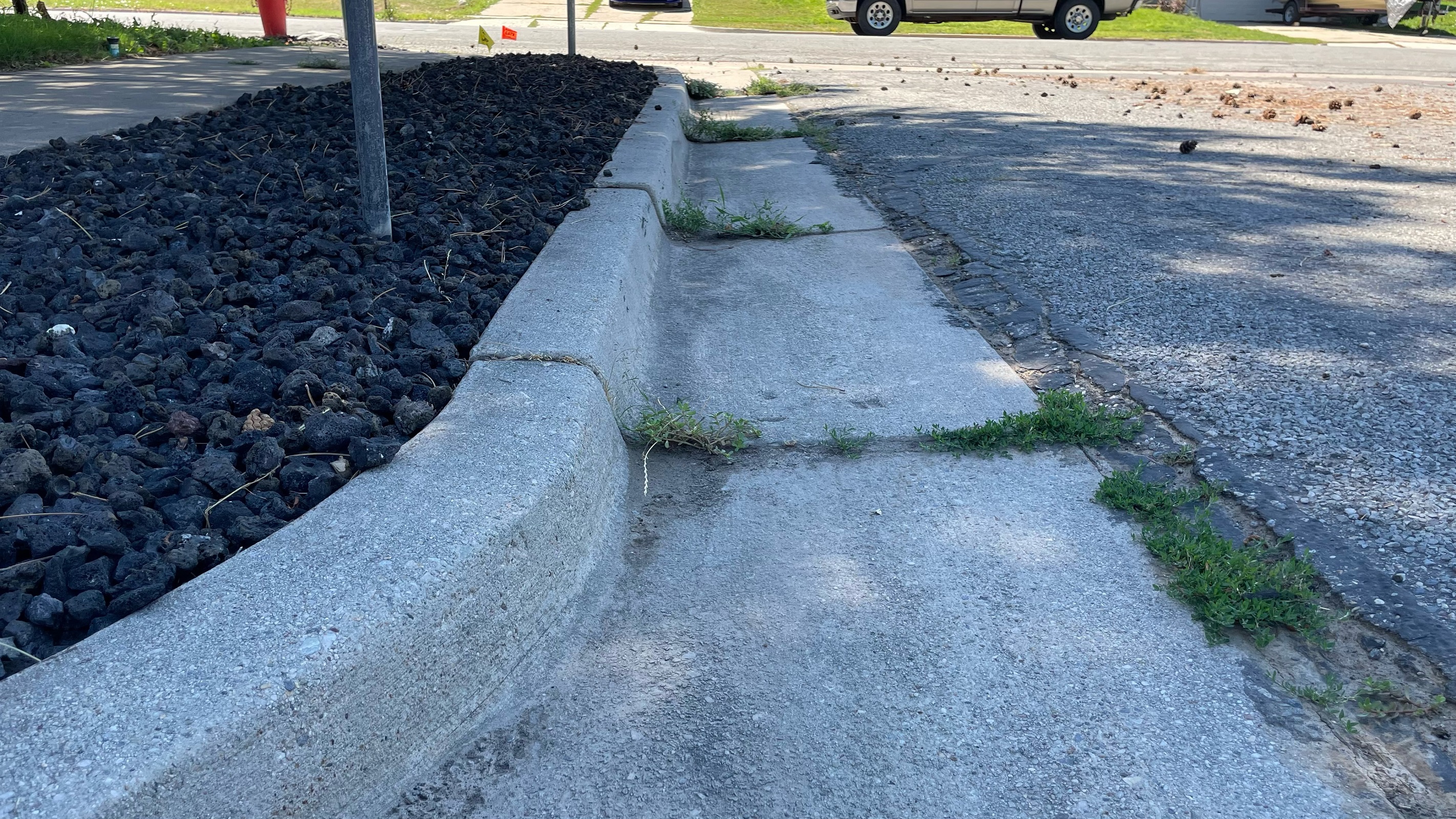Power: battery
Air velocity: 170MPH
Control: Turbo boost and cruise control
Battery life: 30 Minutes (manufacturer)
Weight: 9.8 pounds (with battery installed)
I believe it was Shakespere that said, “to cord, or not to cord, that is the question.” I might be misquoting there, but when it comes to leaf blowers, that is the ultimate decision point. I own a corded leaf blower as my primary yard cleanup tool. I can say unequivocally, that a battery powered leaf blower, like the Greenworks Pro 80V Leaf Blower, will save you time and energy, compared to a corded model.
I tested the Greenworks Pro 80V battery life, both on normal and max power. I tested how long the battery takes to charge from dead to full. I also tested the performance of the leaf blower by spreading grass (after I mowed my lawn) on my back patio. It’s currently summer in Utah, and there aren’t any leaves to blow. That being said, I do have a giant pine tree in my front yard that dumps a record amount of pine needles and pine cones into my parkstrip that my corded leaf blower struggles to remove. I also used that frustrating and recurring pile of pine needles and cones to test the air pushing power of the leaf blower. And finally, I used a sound decimetre app on my phone to test the loudness of the blower.
After putting the Greenworks Pro 80V through the ringer, there are definite reasons to love this leaf blower and areas of improvement. How does it compare to the best leaf blowers available? Read on to find out.
Greenworks Pro 80V: First Impressions
Out of the box the Greenworks Pro 80V comes with one battery, the battery charger, the blower (the motor) and the blower cone that is in two pieces. The long blower nozzle snaps easily onto the motor and the secondary tip snaps to the end of the long section. The installation takes roughly a minute to put together. The battery does take a hefty smack to lock into place on the backside of the motor. But to release the battery, an easy downward press of the green release button does the trick.
Initially, there were two main features that I thought were especially useful – the cruise control, and the adjustable trigger. With my current cordless blower, you turn it on, and full speed ahead is all you get. With the Greenworks Pro 80V you can softly press the trigger to maintain a much less rate of speed. The harder you press, the harder it will blow. You’d think with a leaf blower, you’d want it to blow as hard as possible at all times, but that wasn’t the case when I was blowing pine cones and needles from my parkstrips (more on that in the testing section).
The cruise control is also a convenient feature. Instead of having to hold the trigger the entire time you’re using the blower, you can press the green locking handle clockwise and it will lock the trigger in place. This way you get a consistent flow of air, and you don’t have to worry about holding the trigger. I found it to be quite useful, especially when blowing all the grass and dirt off of my back patio. And if you need a little extra bump in performance, you can press and hold the green “turbo” button above the trigger.
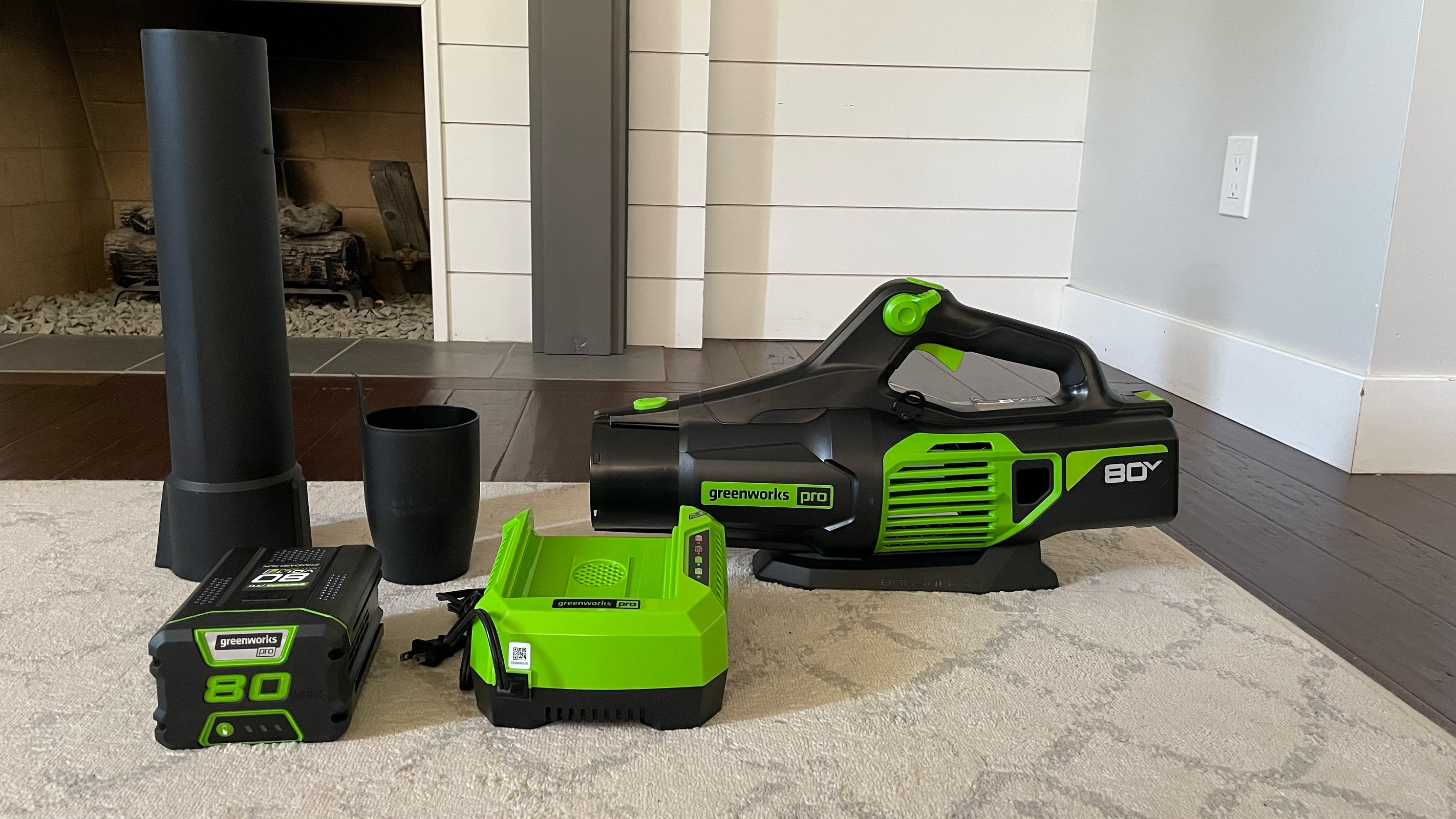

Jonathan Knoder is a freelance writer and editor and covers a variety of topics from tech to lifestyle, but he has a special affinity for audio gear and smart home tech. In the smart home space, he’s tested and reviewed everything from smart locks, and home security cameras, to robot vacuums and air quality monitors. His writing has been featured in Top Ten Reviews, Tom's Guide, SPY.com, Security Sales and Integration and Salt City Hoops. Outside of work, Jonathan is usually playing guitar and drums, at the park with his dog, or pretending to be a golfer at his local golf course.
Jonathan tested the leaf blower by removing grass trimmings, and dirt from his back patio and from the sidewalk on his front lawn. He also tested it by removing pine needles and pine cones from his parkstrips. Finally, battery testing was conducted to see how long it would last during consistent use on both full throttle and with the turbo button activated.
Greenworks Pro 80V: Price and Availability
List price: $219.99
The Greenworks Pro 80V leaf blower has a list price of $219.99. This includes the leaf blower as well as a battery and the charger. You can also buy just the leaf blower from the manufacturer for $179.99.
It's available to buy direct from Greenworks, or from resellers such as Best Buy.
Score: 4/5
Greenworks Pro 80V: Design
I liked the simplicity of the design as well as the additional functional features. As mentioned previously, the leaf blower takes all but a minute to install. Even though the battery pack took a good smack to get into the back chamber, once it’s in, there’s real peace of mind knowing it's not going to go anywhere. About half the leaf blower’s weight comes from the battery pack, and even at 9.8 pounds, the leaf blower starts to feel heavy and takes its toll on the forearms after only a few minutes.
When you hold the leaf blower, the weight distribution points the nozzle downwards towards the ground naturally. I didn’t mind it. In most cases, you’ll be pointing the leaf blower towards the ground anyway. The natural lean of the leaf blower does some of the work for you.
As I mentioned in the intro, I really enjoyed the cruise control. It doesn’t only lock it at full blast either. As you turn the knob clockwise, it will lock the trigger into place in any position. Even if you want to lock in the blower to 50% power, you can do so. I found that design feature to be incredibly helpful.
Score: 4/5
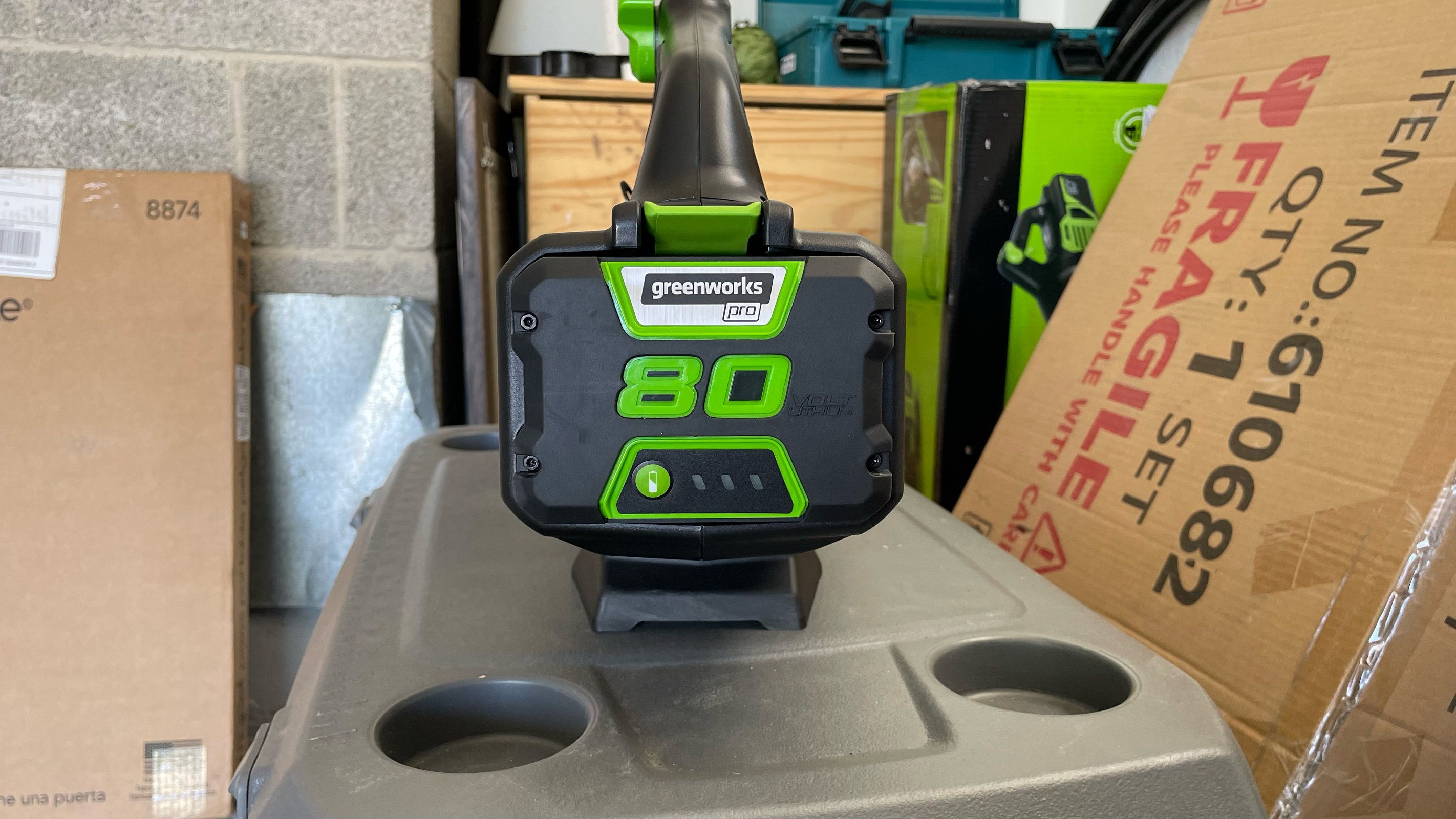
Greenworks Pro 80V: Performance
The first thing I tested was the battery life. After completing a full charge, I used the locking knob to lock the trigger on full throttle (but not with the turbo pressed), and let the leaf blower run until the battery completely drained. I clocked 19:49 seconds, just shy of 20 minutes. This was a little disappointing considering the manufacturer claims 30 minutes of run time.
Now that the battery was dead, I tested the time it took to charge. The battery was fully charged after one hour and eight minutes on the charger, which I felt was relatively quick considering that other power tools with similar battery types can take multiple hours to reach a full charge.
And now that the battery was recharged, I retested the battery life when both the throttle and turbo button were both going full steam. Instead of holding it manually, I used a little ingenuity and taped a small weight down on the turbo button. At complete non-stop turbo speed the battery died after 12 minutes and 11 seconds. Needless to say, the turbo button is a major drain on the battery.
For the debris removal testing, I mowed my lawn and poured out the grass clippings all over my back patio. The grass was a little wet too, making it more mulch-like and sticky. I used the leaf blower to clear the debris. Even without using the turbo setting, it was able to remove all of the grass without any issues.
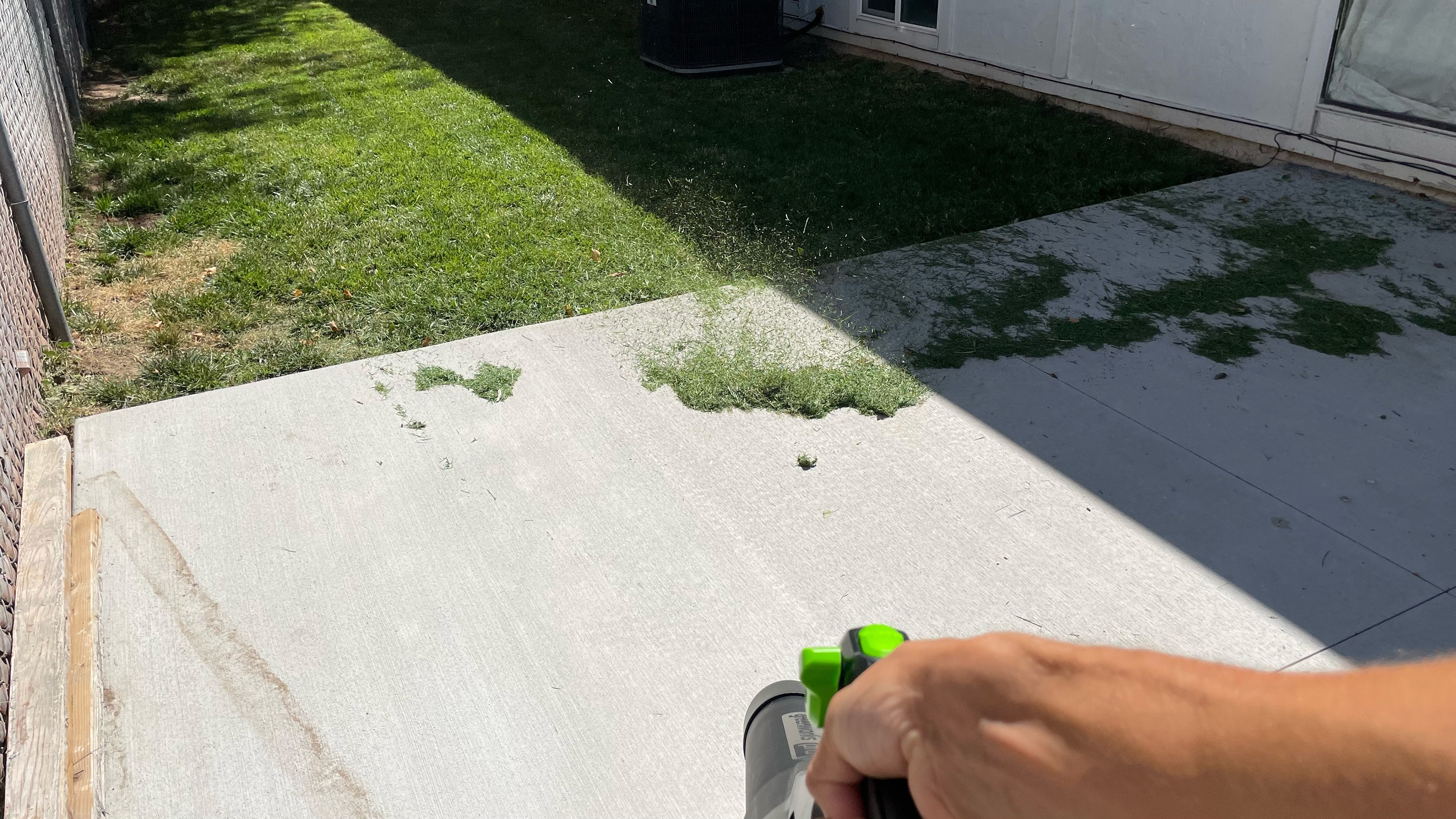
I have a dreaded pine tree that sheds an infinite amount of pine needles and cones in a section of the parkstrips on the corner of my home. The park strips are filled with rocks, and the pine needles get stuck in them. I couldn’t use the blower at full power because it would blow all the rocks out of the park strip (I didn’t want that). This is where the lower level of blowing power came into use. Using about 50% power (pulling the trigger only half way) I was able to blow out many of the pine needles without blowing out the rocks. As all the debris made it to my gutter, I was able to easily clear out that debris, along with heavier rocks and dirt from the road with the turbo setting. This leaf blower certainly doesn’t lack blowing power.
The final test was to measure how loud the blower was. At full throttle, the blower makes 102 dB of sound. That’s about the same as a hair dryer or lawn mower. And even with the turbo button pressed, it only inches up to 103. Regardless, it’s a bit on the loud side for a leaf blower.
Score: 4/5
How does the Greenworks Pro 80V compare to competing models?
When compared to the likes of the Black & Decker LSWV36, the Greenworks Pro 80V has much more blowing power at 170 MPH compared to 120 MPH from the Black and Decker. The former struggled with wet grass while the Greenworks Pro made light work from wet grass. The trade off is the B&D model is much lighter, quieter and less expensive.
The Toro 51619 is much more powerful of a blower than the Greenworks Pro 80V with 250 MPH worth of blowing power, but you’ll be dealing with a cord. After having used the Greenworks Pro 80V, I have realized how much time I spend with my corded leaf blower unraveling the cord, untangling it, moving it around trees and sprinklers, and winding it back up. If you have a lot of wet debris to blow around, I understand the need for extra power, but for everything I did, and what I believe most people would use a leaf blower for, the Greenworks Pro 80V had plenty of power.
The Black and Decker LB700 is another corded model that is lighter, just as powerful and much more affordable than the Greenworks Pro V80. If you’re on a budget, and want to save your forearms, this is a great choice. But again, you’re dealing with the restrictions of a cord, which makes the extra price of the Greenworks Pro 80V worth it to me.
Should you buy the Greenworks Pro 80V?
| Attribute | Notes | Rating |
|---|---|---|
| Price & availability | More expensive than average | 4/5 |
| Design | Love the adjustable trigger and locking knob, but the leaf blower is on the heavier side | 4/5 |
| Performance | Good air velocity, but battery life less than manufacturer states | 4/5 |
Buy it if...
Don't buy it if...
How we tested the Greenworks Pro 80V
I tested the battery life by locking the cruise control on full throttle and timing how a full battery took to completely drain. Then I timed how long it took to charge the dead battery back to full.
For the sound testing, I downloaded a decibel meter to my iPhone and measured how loud the motor was at full throttle, and with the turbo button pressed.
To test the debris removal performance, I mowed my lawn and poured the debris on my back patio and used the leaf blower to remove the debris. I also tested it on my parkstrips to remove pine needles and pine cones that stick in the rocks of the park strips.
See more about how we test.
